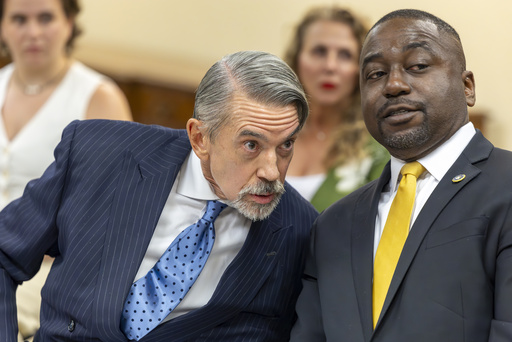NEW ORLEANS — As World War II loomed, Nazis in Austria confiscated a pastel created by the famous impressionist Claude Monet, igniting a family’s extensive search that found resolution this past Wednesday in New Orleans.
At an FBI field office, agents unveiled the Monet pastel, revealing it to the granddaughters of Adalbert Parlagi more than eight decades after it was forcibly taken from their family. Helen Lowe expressed a feeling that her grandfather would be watching this moment, remarking that he would be “so, so proud” of the unveiling.
Monet’s 1865 piece, titled “Bord de Mer,” portrays the rocky shores of the Normandy coastline, significant as the site of the D-Day invasion by Allied forces in 1944, a crucial turning point in the conflict. This work is among 20,000 items recovered by the FBI Art Crime Team, in a larger context of the estimated 600,000 artworks plus countless books and religious objects looted by the Nazi regime.
“It wasn’t just random theft; it was part of the Nazis’ concerted effort to eradicate every trace of Jewish life across Germany and Europe,” noted U.S. State Department Holocaust advisor Stuart E. Eizenstat in a speech in March.
Following the annexation of Austria by Nazi Germany in 1938, Adalbert Parlagi, a prosperous businessman and passion-driven art collector, along with his wife, Hilda, were forced to abandon nearly all their possessions and flee Vienna. Using British license plates for their covert escape across the border, their granddaughters recounted. Despite not identifying as Jewish for some time prior and having their children baptized as Protestants, Austrian governmental documents classified them as Jewish, putting them at risk from the Nazi regime. Tragically, some family members did not survive the Holocaust and perished in concentration camps.
The couple attempted to export valuable belongings, such as carpets and artworks, to London, but their valuables were ultimately confiscated and auctioned by the Gestapo to finance the Nazi war effort.
Since 1943, several international declarations have condemned the trade in art looted during the Nazi era, marked by the Washington Principles of 1998, which were endorsed by more than three dozen nations advocating for the restitution of stolen artworks.
However, efforts by Adalbert Parlagi to reclaim his artworks faced obstructions from the Vienna auctioneer who handled the sale of the Monet pastel, as well as another artwork he owned. The auctioneer claimed that records were lost amid the fighting in Vienna and later informed Adalbert of this in a letter shortly after the war.
“I also cannot recall two such pictures either,” the auctioneer communicated in response.
The arduous journey of recovering lost artworks often leads survivors of World War II and their descendants to abandon their pursuits due to relentless challenges, shared Anne Webber, co-founder of the London-based nonprofit Commission for Looted Art in Europe, which has successfully reclaimed over 3,500 artworks. “It requires constant diligence and perseverance,” she added.
Adalbert Parlagi and his son Franz maintained detailed records of ownership and their ongoing search. After Franz’s death in 2012, Françoise Parlagi discovered her father’s documents, including the original receipt for her grandfather’s Monet pastel. In 2014, she sought assistance from Webber’s commission. Initial research yielded no leads, with their team finding “absolutely no trace” of the pastel, Webber reported. However, in 2021, they uncovered information indicating that a New Orleans art dealer had purchased the Monet in 2017, subsequently selling it to a doctor and his wife in Louisiana.
The FBI took action based on the commission’s findings, and a federal court subsequently ruled that the pastel should be returned to the Parlagi descendants.
“There was never a question about returning the artwork to its rightful owners once we learned its troubled history,” declared Bridget Vita-Schlamp, whose late husband had acquired the Monet pastel.
Initial shock accompanied the news of the painting’s return, she admitted. The Parlagi family had also recovered another piece in March from the Austrian government, yet six artworks remain missing, including notable pieces by Camille Pissarro and Paul Signac. According to Kristin Koch, supervisory special agent with the FBI’s Art Crime Program, the United States may be the “largest illegal art market in the world.”
Webber stressed that the art community bears a significant responsibility to clarify the provenance of artworks and has a moral duty to return looted pieces to their legitimate owners. “These artworks embody lives that were lost and a world that was forcibly taken from people,” she stated.
The Parlagi granddaughters express gratitude for what they have successfully reclaimed. Françoise Parlagi, beaming with joy, shared her aspiration to display a copy of the pastel in her home, calling the experience “unreal.”
“Many families share this plight. Some may not even attempt to recover their lost art because they doubt it is feasible,” she noted. “We aim to be a beacon of hope for other families.”



